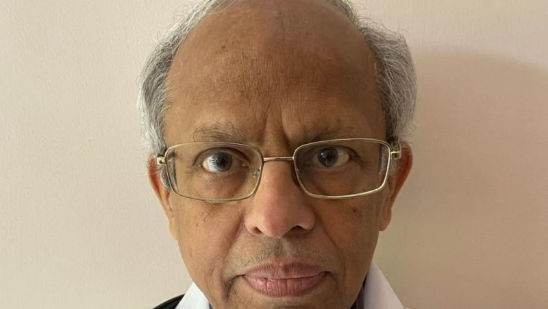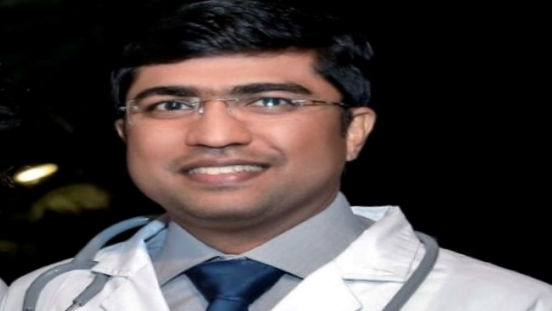Consult Haematology Doctors Online - Haematologists (20 doctors)

Dr. Purvi Kadakia Kutty
Paediatric Haematologist
10 Years • MD Paediatrics FNB Pediatric Haem. & Onco.
Mumbai
Apollo Hospitals CBD Belapur, Mumbai
Dr Abilash Jain
Diabetologist
12 Years • MBBS,DNB(FM),MNAMS,FIAMS,CCGMG(GERIATRICS),DGM (GERIATRICS),PGCD(DIABETES,BOSTON UNIVERSITY),FID(DIABETICS UK)CCEPC(PALLIATIVE CARE),CCCC(CRITICAL CARE)
Visakhapatnam
Apollo Clinic Vizag, Visakhapatnam

Dr. E Prabhakar Sastry
General Physician/ Internal Medicine Specialist
40 Years • MD(Internal Medicine)
Manikonda Jagir
Apollo Clinic, Manikonda, Manikonda Jagir

Dr Vijaykumar Shirure
Haematologist
8 Years • MBBS, MD, DM (Clinical Hematology), Fellow (Hemato-oncology), Fellow (Bone Marrow Transplantation)
Ahmedabad
Apollo Hospitals Gandhinagar, Ahmedabad

Dr. Prathyush V
Medical Oncologist
12 Years • MBBS, ONCOLOGY, MD, RADIATION DNB in NBE
Bengaluru
Apollo Hospitals Bannerghatta Road, Bengaluru

Dr. Pritish Chandra Patra
Haematologist
12 Years • MBBS, MD (General Medicine), DM (Clinical Hematology), PDCC (Hemato-Oncology), Fellowship in BMT.
Bhubaneswar
Apollo Hospitals Old Sainik School Road, Bhubaneswar

Dr. Prabu P
Haematologist
29 Years • MBBS, MD(Gen.Med.)(JIPMER) , MRCP, Dip RCPath, FRCPath, CCT(U.K), Haemato - Oncology.
Chennai
Apollo Hospitals Greams Road, Chennai
250+ recommendations

Dr. Srikanth M
Haematologist
25 Years • MD, MRCP, FRCPath, Dip. RCPath, CCT, Heam.
Chennai
Apollo Hospitals Greams Road, Chennai
100+ recommendations

Dr. Neema Bhat
Haematologist
10 Years • MBBS, MD (USA), FAAP (USA)
Bengaluru
Apollo Hospitals Bannerghatta Road, Bengaluru

Dr. Padmaja Lokireddy
Haematologist
10 Years • MBBS, MD (Int. Med.), MRCP, FRCPath (Haematology)CCT
Hyderabad
Apollo Hospitals Jubilee Hills, Hyderabad
100+ recommendations
What is Haematology?
Haematology is a medical speciality that deals with the study of blood, blood-forming tissues, and blood-related disorders. Haematologists are specialised doctors who diagnose and treat conditions related to blood and bone marrow, such as leukaemia, lymphoma, anaemia, and clotting disorders.
The study of haematology includes the examination of blood cells and tissues under a microscope to understand their structure, function, and abnormalities. Haematologists also study the chemical and physical properties of blood, including its components, such as red blood cells, white blood cells, and platelets. Haematologists also work in collaboration with other medical professionals to diagnose and manage diseases that affect the bone marrow, lymphatic system, and spleen.
Who is a Haematologist?
A haematologist is a doctor who specialises in the diagnosis and treatment of blood disorders. Haematologists are highly trained medical professionals who have completed medical school and a residency programme in internal medicine. They have further specialised training in haematology, oncology, or both.
Haematologists work closely with other medical professionals, such as oncologists, pathologists, and radiologists, to provide comprehensive care to patients with blood disorders. They evaluate symptoms, perform diagnostic tests, and develop customised treatment plans that may include medication, transfusions, stem cell transplants or chemotherapy.
When Should You Consult a Haematology Doctor?
If you experience any symptoms related to blood disorders such as abnormal bleeding, bruising or clotting, fatigue, weakness, or shortness of breath; it is important to consult a haematology doctor. You should consult a haematology specialist if you experience any signs or symptoms of a blood disorder such as:
- Unexplained fatigue
- Shortness of breath
- Rapid heart rate
- Recurrent infections
- Persistent fever
- Easy bruising or bleeding
- Swollen lymph nodes
- Sudden weight loss
If you have already been diagnosed with a blood disorder or cancer, it is essential to consult an oncologist haematologist for appropriate treatment management. Timely diagnosis and management by a haematology doctor can provide better health outcomes for patients.
What Medical Conditions Do Haematologists Treat?
Haematologists diagnose and treat many different types of conditions related to blood and bone marrow. Here are some examples:
- Anaemia: A condition where the body doesn't produce enough red blood cells or haemoglobin, causing fatigue and weakness.
- Bleeding disorders: Hemophilia and von Willebrand disease are two examples of bleeding disorders that prevent blood from clotting properly.
- Blood cancers: Leukemia, lymphoma, and multiple myeloma are types of blood cancers that require diagnosis and treatment by an oncologist haematologist.
- Clotting disorders: Thrombophilia and deep vein thrombosis are examples of conditions where the blood clots too easily, which can lead to serious health problems.
- Platelet disorders: Thrombocytopenia and immune thrombocytopenia are examples of conditions where the body doesn't produce enough platelets, which can lead to excessive bleeding.
- Bone marrow failure syndromes: These are rare conditions where the bone marrow fails to produce sufficient healthy blood cells.
What Are the Different Types of Procedures Conducted by Haematology Specialists?
Haematologists perform many procedures to diagnose and treat blood disorders. Here are some common ones:
- Bone marrow biopsy: A procedure where a small amount of bone marrow is removed from the hipbone or breastbone to examine under a microscope for abnormalities
- Blood transfusion: A procedure where blood is given to a patient to replace lost blood due to surgery, injury, or illness
- Chemotherapy: A cancer treatment that uses drugs to destroy cancer cells
- Stem cell transplant: A procedure where stem cells are transplanted into a patient's bone marrow to replace damaged stem cells
- Venipuncture: A procedure where a small amount of blood is withdrawn from a vein for diagnostic testing
How Can I Consult a Haematology Specialist?
If you have symptoms related to blood disorders or suspect that you may have a condition requiring consultation with a haematology doctor, book a consultation on Apollo 24/7 today. You can book an appointment with a haematologist through the website or mobile application in just a few easy steps. Additionally, you can consult with an online doctor anytime, anywhere for advice, diagnosis, and treatment.
During your initial consultation with the haematologist, you will undergo a physical examination and diagnostic tests. These may include laboratory tests, imaging studies, and biopsies. Once diagnosed, the haematologist will develop a personalised treatment plan tailored to your specific medical condition.
The Role of Haematology Specialist in Healthcare
Haematology specialists play a crucial role in healthcare by diagnosing and treating blood disorders that can have serious health consequences. They work closely with other medical professionals to provide comprehensive care to patients with complex medical conditions.
Haematologists also conduct research to improve our understanding of blood disorders and develop new treatments that can benefit patients. They are an essential part of the healthcare team and contribute significantly to patient care and outcomes.
Haematologists in Other Top Cities
Doctors in Top cities
- •Top Doctors in Hyderabad
- •Top Doctors in Bengaluru
- •Top Doctors in Chennai
- •Top Doctors in Kolkata
- •Top Doctors in Mumbai
- •Top Doctors in New Delhi
- •Top Doctors in Bangalore
- •Top Doctors in Pune
- •Top Doctors in Delhi
- •Top Doctors in Gurugram
- •Top Doctors in East Godavari
- •Top Doctors in Noida
- •Top Doctors in Ahmedabad
- •Top Doctors in Lucknow
- •Top Doctors in Ghaziabad
- •Top Doctors in Visakhapatnam
- •Top Doctors in Guwahati
- •Top Doctors in Madurai
- •Top Doctors in Bhubaneswar
- •Top Doctors in Vijayawada
Related Treatments
- •Treatment for Anemia
- •Treatment for Anemia Treatment
- •Treatment for Bernard Soulier Syndrome
- •Treatment for Burkitt Lymphoma
- •Treatment for Chelation Therapy
- •Treatment for Aplastic anemia
- •Treatment for Blood Cancer
- •Treatment for Blood Disorders
- •Treatment for Acute Lymphoblastic Leukemia
- •Treatment for Acute lymphocytic leukemia
- •Treatment for Acute myelogenous leukemia
- •Treatment for Acute Myeloid Leukemia
- •Treatment for Anemia In Newborns
- •Treatment for Breathing Problems
- •Treatment for Cerebral Venous Thrombosis
- •Treatment for Childhood Acute Lymphoblastic Leukemia
- •Treatment for Chronic Lymphocytic Leukemia
- •Treatment for Chronic Myelogenous Leukemia
- •Treatment for Chronic Myeloid Leukemia
- •Treatment for Complex Regional Pain Syndrome
FAQs
What is the difference between a haematology doctor and an oncologist haematologist?
While both haematology doctors and oncologist haematologists specialise in blood disorders, oncologist haematologists have additional training and expertise in the diagnosis and treatment of blood-related cancers.
How does a haematology specialist diagnose blood disorders?
Haematologists use a variety of tests to diagnose blood disorders, including blood tests, bone marrow biopsies, and genetic testing.
What are some common blood disorders treated by haematology specialists?
Haematology specialists treat a wide range of blood disorders, including anaemia, haemophilia, sickle cell disease, leukaemia, and lymphoma.
What are some of the lifestyle changes that can help manage blood disorders?
Haematologists may recommend changes such as a healthy diet, regular exercise, and stress management techniques to manage blood disorders.
Is it necessary to visit a haematology specialist only when diagnosed with a blood disorder?
No, a haematology doctor can also diagnose and treat conditions that may not be directly related to the blood, such as bleeding disorders, clotting disorders, and immune system disorders.
Can genetics play a role in blood disorders?
Yes, genetics can play a role in many blood disorders. Some are inherited genetically while others arise due to mutations in our genes. Haematologists can conduct genetic testing to determine the presence of inherited disorders and create a treatment plan accordingly.
What is the role of a haematology specialist in managing cancer treatment?
Haematology specialists often play a critical role in managing cancer treatment plans that involve chemotherapy or radiation therapy because these treatments can impact the patient's blood counts.
Can diet affect blood disorders?
Yes, diet can affect certain blood disorders such as anaemia or iron-deficiency anaemia where dietary changes can help correct abnormal levels of iron and haemoglobin.
What can I expect during my first appointment with a haematology specialist?
During your first appointment, the haematology doctor will review your medical history, perform a physical exam, and may order blood tests to help diagnose or manage your condition.
Are there any side effects associated with treatments offered by haematology specialists?
Yes, side effects can vary depending on the specific treatment, but common side effects include fatigue, nausea, hair loss, and increased risk of infection.